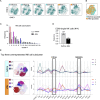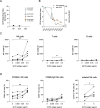Immunological effects of CD19.CAR-T cell therapy in systemic sclerosis: an extended case study
- PMID: 39673062
- PMCID: PMC11639114
- DOI: 10.1186/s13075-024-03451-1
Immunological effects of CD19.CAR-T cell therapy in systemic sclerosis: an extended case study
Abstract
Objective: The high potential of CD19.CAR-T cells to treat autoimmune diseases such as Systemic Sclerosis (SSc) supposedly relies on the disappearance of autoantibodies. Here we investigated effects of CAR-T cells on the innate immune system which is an important contributor to pathology in SSc.
Methods: Longitudinal analysis of peripheral blood mononuclear cells from an Scl70 + SSc patient treated with CAR-T cells sampled over 18 months by 29-color spectral flow cytometry, in vitro experiments using sera from patient cohorts.
Results: In the patient treated with CAR-T cells, the substantial clinical improvement was paralleled by dynamic changes in innate lymphoid cells, namely Fcγ-receptor IIIA-expressing natural killer (NK) cells. NK cells adopted a more juvenile, less activated, and less differentiated phenotype. In parallel, the potency of serum to form Scl70-containing immune complexes that activate Fcγ-receptor IIIA decreased over time. These observations suggested a mechanistic link between reversal of adaptive autoimmunity and recovering Fcγ-receptor IIIA-expressing innate immune cells after CAR-T cell therapy via regressing immune complex activity. Experiments with sera from the non-CAR-T-treated SSc cohort confirmed that Scl70-containing immune complexes activate Fcγ-receptor IIIA-expressing NK cells in a dose-dependent manner, substantiating the relevance of this link between adaptive and innate immunity in SSc.
Conclusion: This report describes for the first time the phenotypic recovery of innate Fcγ-receptor-expressing cells in an SSc patient treated with CAR-T cells. Decreasing autoantibody levels associated with a reduced ability to form functional immune complexes, the latter appearing to contribute to pathology in SSc via activation of Fcγ receptor IIIA + cells such as NK cells.
Keywords: CAR-T cell therapy; Fcγ receptor; NK cells; NKG2A; Pulmonary fibrosis; Systemic sclerosis.
© 2024. The Author(s).
Conflict of interest statement
Declarations. Ethics approval and consent to participate: The CAR-T cell patient, SSc patients, SLE patients and healthy donors gave their written informed consent to the therapeutic procedures, blood donations and publication. The ethics committee of Heidelberg University, Germany, approved this study (S272/2021). Consent for publication: The CAR-T cell patient, SSc patients, SLE patients and healthy donors gave their written informed consent to the therapeutic procedures, blood donations and publication. Competing interests: provided upon request.
Figures



References
Publication types
MeSH terms
Substances
LinkOut - more resources
Full Text Sources
Medical

